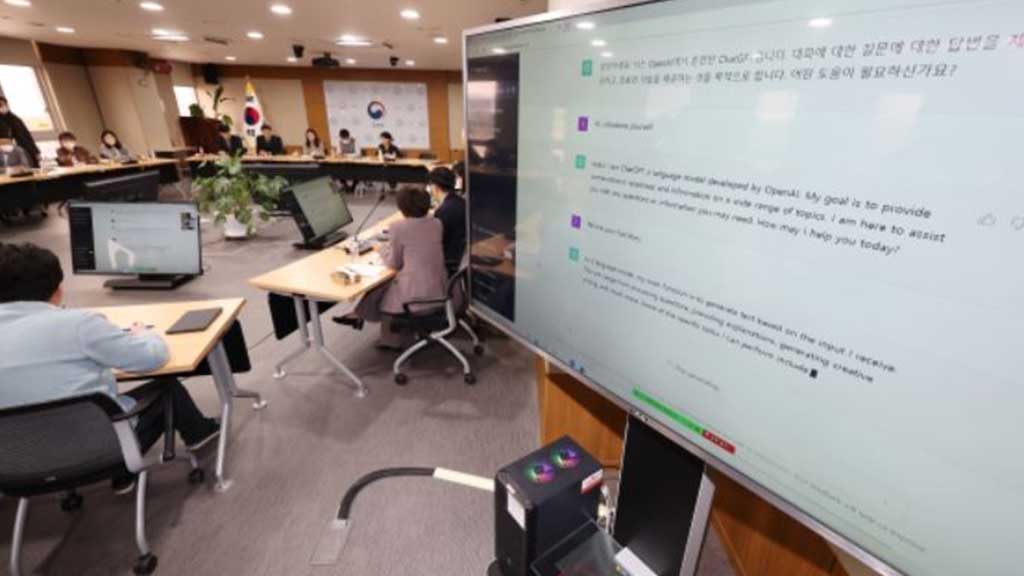News
Samsung to develop generative AI solutions like ChatGPT

Samsung is promoting the development of generative AI solutions (like ChatGPT) optimized for translation and document summarization on its own. The company has decided to ban the use of generative artificial intelligence (AI) such as ChatGPT through in-house PCs, reports SBS Biz.
According to the report, on April 28, Samsung announced that it would temporarily restrict the use of generative AI through in-house PCs from this month in relation to the company’s internal ChatGPT policy for employees in the Device eXperience (DX) sector.
In addition to this, the South Korean tech giant reportedly asked employees to be careful not to enter company-related information or personal information of themselves or others even when using generative AI outside the company via mobile devices.
After restricting the use of AI chatbot in the work field, Samsung is allegedly preparing solutions optimized for translation, document summarization, and software development support by using various forms of AI models on its own.
In the recent past, some employees at the Semiconductor (DS) division uploaded secret information on ChatGPT, which led to restriction on the use of AI chatbot at Samsung. The contents of the accident identified by Samsung were “2 cases of leakage of equipment information” and “1 case of leakage of meeting contents.”

Samsung x ChatGPT
As a result of a survey on the use of ChatGPT for employees in the DX division, a significant number of executives and employees answered that they use ChatGPT in-house for reasons such as quick information acquisition and work convenience.
In particular, it was reported that there was a high demand for the use of generative AI in translation and document summarization. However, 65% of respondents said that there is a security risk when using it in-house. Meanwhile, Samsung Elec said:
“Since the information entered into the generative AI is transmitted and stored to an external server and used for AI learning, it is impossible to retrieve or delete the content once uploaded, so important information of the company can be used as an answer to other people’s questions. There are serious security risks.”
News
Forbes: Samsung’s Jay Y. Lee is the richest Korean in 2024

Samsung’s executive chairman Jay Y. Lee (Lee Jae-yong in Korean) topped the Forbes 2024 Richest Korean list for the first time. On April 17, Forbes revealed that the Samsung boss is the richest in South Korea, with his assets increasing by $3.5 billion, bringing his total net worth to $11.5 billion.
Thanks to a rise in Samsung’s stocks, Samsung’s Lee jumped to the top of the Forbes 2024 Richest Korean list. Notably, the company’s stocks significantly hiked after the revelation that it’s developing high-bandwidth memory chips used in AI computing for NVIDIA.
Forbes 2023 Richest Korean, Kim Byung-ju, slipped to second this year with assets worth $9.7 billion. The third place went to Seo Jung-jin, honorary chairman of Celltrion, with assets of $7.5 billion.
Cho Jung-ho, chairman of Meritz Financial Group, ranked fourth with $6.2 billion, and Chung Mong-koo, honorary chairman of Hyundai Motor Group, was fifth with $4.6 billion.

Stay up-to-date on Samsung Galaxy, One UI & Tech Stuffs by following Sammy Fans on X/Twitter. You can also discover the latest news, polls, reviews, and new features for Samsung & Google Apps, Galaxy Phones, and the One UI/Android operating system.
Do you like this post? Kindly, let us know on X/Twitter: we love hearing your feedback! If you prefer using other social platforms besides X, follow/join us on Google News, Facebook, and Telegram.
News
Samsung builds AI-focussed Advanced Processor Lab in the US
Samsung established an AI chip design-dedicated Advanced Processor Lab in Silicon Valley, US. Formerly known as the Advanced Institute of Technology, Samsung’s SAIT is said to have formed the new Lab to strengthen its AI chip R&D in the US.
BusinessKorea reports that the new Samsung Advanced Processor Lab to focus on developing next-gen AI semiconductor design assets in the US. The assets are said to be focused on the RISC-V area, which serves as a foundational design asset for semiconductor chip design.
Samsung’s initiative with RISC-V is interpreted as a move towards technological independence. Therefore, the company is expanding its R&D organization in Silicon Valley, aiming to enhance design capabilities to disrupt the market currently dominated by NVIDIA.
Amid the booming AI era, the market of advanced semiconductors is also expanding. Samsung has completed the development of its Mach-1 AI semiconductor and supplied prototypes to global firms including Korea’s Naver. The company has also started the development of Mach-2.
Under the CHIPS Act, Samsung received huge subsidies to boost investment in the US. It’s worth noting that the Biden govt awarded a 12% subsidy of Samsung’s total investment, which is significantly higher than Intel and TSMC’s subsidy.
Stay up-to-date on Samsung Galaxy, One UI & Tech Stuffs by following Sammy Fans on X/Twitter. You can also discover the latest news, polls, reviews, and new features for Samsung & Google Apps, Galaxy Phones, and the One UI/Android operating system.
Do you like this post? Kindly, let us know on X/Twitter: we love hearing your feedback! If you prefer using other social platforms besides X, follow/join us on Google News, Facebook, and Telegram.
News
Samsung Galaxy S25’s 3nm Exynos 2500 to beat Snapdragon 8 Gen 4 in power efficiency

Samsung’s first 3nm Exynos 2500 chip could outpace Snapdragon 8 Gen 4 in power efficiency. Both chipsets will power the next-gen Galaxy flagships, scheduled for an early 2025 launch. Recent input suggests that Exynos is returning as a tough rival to Snapdragon.
The Exynos 2500 will be made on Samsung’s 2nd-gen 3nm process technology. The S24’s Exynos 2400 chipset impressed the industry with significant improvements over its predecessor. The company appears to be leveling up the game next year.
Thanks to the cutting-edge process node, Samsung’s next Exynos could finally surpass its Snapdragon counterpart in power efficiency. The company may utilize its advanced FOWLP in the Exynos 2500 to make it run at higher clock speeds at the same power consumption level.
Qualcomm is facing power efficiency concerns with its recent Snapdragon chips. Due to reduced efficiency, phone makers are forced to bring up to 5000mAh battery. Samsung apparently seized this opportunity to bring back its in-house Exynos back to the contest.
Stay up-to-date on Samsung Galaxy, One UI & Tech Stuffs by following Sammy Fans on X/Twitter. You can also discover the latest news, polls, reviews, and new features for Samsung & Google Apps, Galaxy Phones, and the One UI/Android operating system.
Do you like this post? Kindly, let us know on X/Twitter: we love hearing your feedback! If you prefer using other social platforms besides X, follow/join us on Google News, Facebook, and Telegram.












